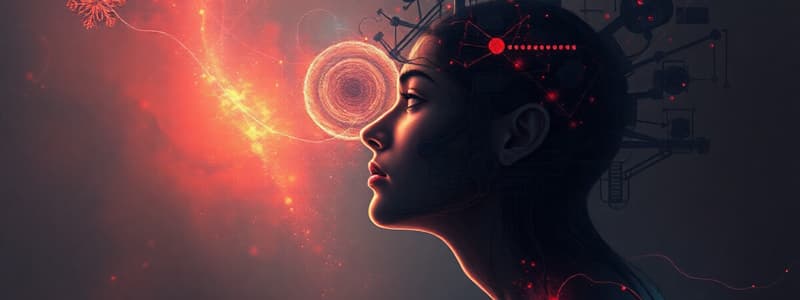Podcast
Questions and Answers
Which of the following accurately describes dissociative fugue?
Which of the following accurately describes dissociative fugue?
- It is characterized by a gradual decline in memory function over time.
- It includes extensive memory loss, potentially resulting in the adoption of a new identity. (correct)
- It involves brief gaps in memory triggered by stress.
- It results from organic brain damage or injuries.
How does dissociative amnesia differ from dementia?
How does dissociative amnesia differ from dementia?
- Dissociative amnesia is always triggered by an emotional event.
- Dementia typically results in memory loss without any identifiable triggers. (correct)
- Dementia does not affect old memories but impacts the ability to learn new information.
- Dissociative amnesia involves knowledge of past events.
Which symptom is NOT typically associated with dementia?
Which symptom is NOT typically associated with dementia?
- Sudden forgetfulness linked to a traumatic event. (correct)
- Slowly fading memories over time.
- Impairment in learning new information.
- Inability to recall past events consistently.
Before diagnosing dissociative amnesia or fugue, which factor must be considered?
Before diagnosing dissociative amnesia or fugue, which factor must be considered?
What common cause of memory loss must be ruled out when diagnosing dissociative disorders?
What common cause of memory loss must be ruled out when diagnosing dissociative disorders?
In dissociative disorders, which aspect of memory is primarily affected?
In dissociative disorders, which aspect of memory is primarily affected?
Which of the following statements about the effects of stress on memory is accurate?
Which of the following statements about the effects of stress on memory is accurate?
Which of the following is a key defining feature of dementia compared to dissociative disorders?
Which of the following is a key defining feature of dementia compared to dissociative disorders?
What is one reason for the controversy surrounding certain diagnoses?
What is one reason for the controversy surrounding certain diagnoses?
What concern might arise when a person suddenly moves to a new place without informing family?
What concern might arise when a person suddenly moves to a new place without informing family?
In the discussion about dissociative disorders, what is implied about patients who seek care?
In the discussion about dissociative disorders, what is implied about patients who seek care?
What is suggested regarding the term used for various dissociative disorders?
What is suggested regarding the term used for various dissociative disorders?
Why might someone believe a person who has disappeared is simply seeking a new life?
Why might someone believe a person who has disappeared is simply seeking a new life?
What complicates the understanding of dissociative identity disorder according to the conversation?
What complicates the understanding of dissociative identity disorder according to the conversation?
What assumption can be made about individuals who do not seek treatment after suddenly relocating?
What assumption can be made about individuals who do not seek treatment after suddenly relocating?
What aspect of diagnostic criteria may lead to some patients being misclassified?
What aspect of diagnostic criteria may lead to some patients being misclassified?
Flashcards are hidden until you start studying
Study Notes
Dissociative Amnesia
-
Involves sudden memory gaps, potentially triggered by stressful events.
-
May involve brief periods of forgetting past events.
Dissociative Fugue
-
Involves sudden extensive memory loss, more extensive than amnesia.
-
Can involve moving to a new location with a different identity and personality.
-
Often involves the individual not being aware of their new identity and personality.
Causes of Memory Loss
-
Before diagnosing dissociative amnesia or fugue, other causes of memory loss should be ruled out.
-
These include:
- Traumatic brain injuries
- Substance use
- Medication side effects
### Dementia
-
A gradual decline in cognitive function with no specific trigger.
-
Not linked to stressful events.
-
Involves difficulty remembering old information and learning new information.
### Differentiation
-
Dissociative amnesia and fugue involve difficulty remembering old information but not learning new information.
-
Dementia involves difficulty with both remembering old information and learning new information.
### Controversy
-
Dissociative fugue can be a controversial diagnosis.
-
Some question whether individuals faking it to avoid a situation or start a new life.
-
This is difficult to evaluate, as those who may be faking it would likely not seek treatment.
Diagnosis
-
The diagnosis of dissociative fugue is formed based on individuals who willingly seek treatment for their condition.
-
This diagnosis is controversial due to its umbrella term application, potentially including individuals who do not want to be diagnosed with it.
Dissociative Identity Disorder (DID)
-
Considered the most controversial diagnosis in the field of psychology.
-
Limited research exists on the topic.
Studying That Suits You
Use AI to generate personalized quizzes and flashcards to suit your learning preferences.



